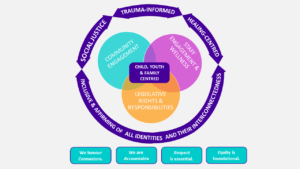Our Commitment to Truth and Reconciliation
We recognize the current and past harms to Indigenous children, youth and families as a result of child welfare practices and colonial history. We are committed to learn and understand these experiences and take the necessary actions to ensure that they are not repeated. We are dedicated to providing culturally affirming services that are delivered in the spirit of truth and reconciliation.
The agency’s Service Principles are in alignment with all legislative requirements and commitments which include:
- Federal Legislation: An Act respecting First Nations, Inuit and Métis children, youth and families (formerly known as Bill-C-92)
- First Nations/Indigenous Service Models
- Current and future partnerships, protocols and collaborations with First Nations, Métis, Inuit communities and collaborators
- Child, Youth and Family Services Act
- The Truth and Reconciliation Child Welfare Calls to Action
- The 9 OACAS Provincial Commitments
- All applicable legislation directly or indirectly related to the engagement and service to First Nations Inuit and Metis children, youth, families and their communities
- Child welfare specific recommendations from the Missing and Murdered Indigenous Women and Girls Inquiry
- The Agency’s Strategic Direction
- A commitment to on-going learning from the past, from the families we are serving and the communities we are working alongside
Social Justice
- The Agency acknowledges the injustices that have led to the present mistreatment and overrepresentation of both Indigenous and Black groups in our system. As a result, the Agency is critically aware of the need to ensure the well-being of both groups by addressing both forms of oppression as we work to provide service to all groups/communities.
Trauma-Informed & Healing-Centred
- All staff to provide culturally safe, healing-centred services which centre the voices, needs and direction of Indigenous communities and legislative rights & responsibilities.
- All staff to provide services that are co-developed and/or endorsed by Indigenous communities
- All staff to have a deeply rooted understanding of historical and present-day traumas, fostered and sustained by child welfare and the Canadian residential school system which continue to have tremendous and on-going impacts on the lives of Indigenous communities.
Inclusive & Affirming of all Identities & their Interconnectedness
- The agency recognizes and acknowledges that we, as individuals, experience all of our identities (e.g. our faith, gender, gender expression, sexual orientation, class, disabilities, etc.) through our racial and Indigenous identities. As a result, service provision is required to be culturally safe and affirming of the child’s/youth’s interconnected identities.
- We recognize that a child/youth may have a previously unknown/unidentified/unstated Indigenous identity(ies). This requires immediate and proactive measures by the Agency to ensure the child/youth is connected to their Indigenous community(ies) and ancestral linage.
- The agency’s work will seek to restore and/or maintain the identity of Indigenous children/youth and their interconnected relationships with their spirituality, traditions/ceremonies, languages, land/territories, communities, nations, families, customs and traditions.
Community Engagement
- All services are to be First Nations, Inuit and Métis community-led and/or informed in partnership with the child/youth’s family.
- Meaningful and intentional efforts to support the child(ren), youth remaining with and connected to their family and/or community are essential to service delivery.
- Engagement with community partners, development of protocols and collaborations with First Nations, Inuit and Métis communities will facilitate safe and responsive service delivery that is preventative and restorative.
- The Agency will centre the well-being of children, youth and their families through collaborative and consultative processes with their communities. This includes band councils, elders, advisors, Métis representatives, and all community voices in the child’s/family’s circle of support in relation to all forms of planning, development and service delivery to ensure a culturally safe approach that addresses the needs of the whole person.
Staff Engagement & Wellness
- The proactive development of staff towards service provision that is community-informed, culturally affirming, safe and responsive to align with the agency’s responsibility and commitments.
- Consult with the agency’s Indigenous staffing advisory regarding service delivery, program development, their wellness and matters that may impact staff and/or local community well-being.
Legislative Rights & Responsibilities
- The implementation of all legislative and practice requirements which includes the Federal Child Welfare Law (Formerly Bill C-92), Bill C84, the Child, Youth and Family Services Act 2017, the Child and Family Services Amendment Act, 2010 and First Nations, Inuit and Métis Service Models.
- Work closely with Indigenous leadership to embed all legislative rights & responsibilities into all aspects of the agency’s work with First Nations, Inuit and Métis children, youth and families. This includes consultation with Federal Act legal experts and organizations.
- Approach and engage First Nations, Inuit and Métis Peoples as sovereign nations with their own distinct identities and legislative rights to self-governance, self-determination, and independence.

